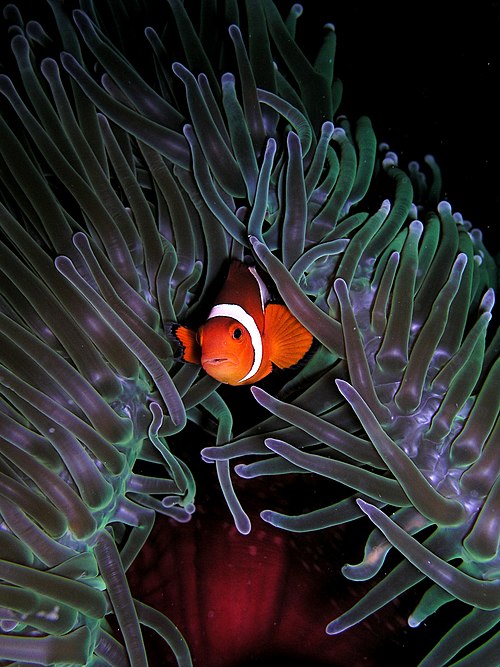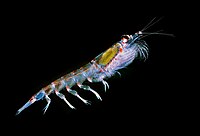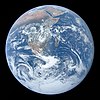Portal:Ecology
| |
|
WikiProject |
Ecology
|
|
Ecology (from Greek: οἶκος, "house" and -λογία, "study of") is the study of the relationships between living organisms, including humans, and their physical environment. Ecology considers organisms at the individual, population, community, ecosystems, and biosphere level. Ecology overlaps with the closely related sciences of biogeography, evolutionary biology, genetics, ethology and natural history. Ecology is a branch of biology, and it is not synonymous with environmentalism. Among other things, ecology is the study of:
Ecology has practical applications in conservation biology, wetland management, natural resource management (agroecology, agriculture, forestry, agroforestry, fisheries), city planning (urban ecology), community health, economics, basic and applied science, and human social interaction (human ecology). The word "ecology" ("Ökologie") was coined in 1866 by the German scientist Ernst Haeckel, and it became a rigorous science in the late 19th century. Evolutionary concepts relating to adaptation and natural selection are cornerstones of modern ecological theory. Ecosystems are dynamically interacting systems of organisms, the communities they make up, and the non-living components of their environment. Ecosystem processes, such as primary production, nutrient cycling, and niche construction, regulate the flux of energy and matter through an environment. Ecosystems have biophysical feedback mechanisms that moderate processes acting on living (biotic) and non-living (abiotic) components of the planet. Ecosystems sustain life-supporting functions and provide ecosystem services like biomass production (food, fuel, fiber, and medicine), the regulation of climate, global biogeochemical cycles, water filtration, soil formation, erosion control, flood protection, and many other natural features of scientific, historical, economic, or intrinsic value. (Full article...) Selected article -
Ecological facilitation or probiosis describes species interactions that benefit at least one of the participants and cause harm to neither. Facilitations can be categorized as mutualisms, in which both species benefit, or commensalisms, in which one species benefits and the other is unaffected. This article addresses both the mechanisms of facilitation and the increasing information available concerning the impacts of facilitation on community ecology. (Full article...)
Selected image -Credit: User:Nhobgood Ocellaris clownfish often live symbiotically with the Heteractis magnifica sea anemone, using them for shelter and protection.
General imagesThe following are images from various ecology-related articles on Wikipedia.
Related WikiProjectsWikiProject Ecology
Things you can do
Entries here consist of Good and Featured articles, which meet a core set of high editorial standards.
Nature, in the broadest sense, is the physical world or universe. "Nature" can refer to the phenomena of the physical world, and also to life in general. The study of nature is a large, if not the only, part of science. Although humans are part of nature, human activity is often understood as a separate category from other natural phenomena. The word nature is borrowed from the Old French nature and is derived from the Latin word natura, or "essential qualities, innate disposition", and in ancient times, literally meant "birth". In ancient philosophy, natura is mostly used as the Latin translation of the Greek word physis (φύσις), which originally related to the intrinsic characteristics of plants, animals, and other features of the world to develop of their own accord. The concept of nature as a whole, the physical universe, is one of several expansions of the original notion; it began with certain core applications of the word φύσις by pre-Socratic philosophers (though this word had a dynamic dimension then, especially for Heraclitus), and has steadily gained currency ever since. (Full article...)Selected biography -Sergei Nikolaievich Winogradsky ForMemRS (or Vinogradskiy; Ukrainian: Сергій Миколайович Виноградський; 1 September 1856 – 25 February 1953) was a Ukrainian microbiologist, ecologist and soil scientist who pioneered the cycle-of-life concept. Winogradsky discovered the first known form of lithotrophy during his research with Beggiatoa in 1887. He reported that Beggiatoa oxidized hydrogen sulfide (H2S) as an energy source and formed intracellular sulfur droplets. This research provided the first example of lithotrophy, but not autotrophy. (Full article...)Did you know (auto-generated)
Selected quote -
Ecology news
Additional News Highlights
Selected publication -Hydrobiologia: The International Journal of Aquatic Sciences is a scientific journal specialising in hydrobiology, including limnology and oceanography, systematics of aquatic organisms and aquatic ecology. (Full article...) Related portalsMore did you know -Related articlesAssociated WikimediaWeb resources
Portals
|
This page was last updated at 2022-03-11 10:53 UTC. Update now. View original page.
All our content comes from Wikipedia and under the Creative Commons Attribution-ShareAlike License.





























